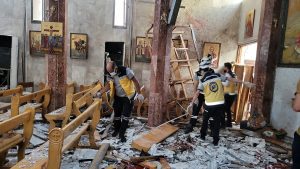(OSV News) – Christians in Syria are reeling after a suicide bombing struck a Greek Orthodox church in Damascus during a June 22 Divine Liturgy.
At least 20 were killed and more than 60 injured that Sunday after an attacker, reported to be armed and wearing an explosive vest, entered Mar Elias, a Greek Orthodox church in the city’s Dweila neighborhood.
Posting to its official Telegram channel, Syria’s Interior Ministry said the bomber was “affiliated with the terrorist organization ISIS,” and that he had opened fire prior to detonating his vest.

Witnesses quoted by The Washington Post said the attacker, whose face was covered, had been charged by a crowd seeking to eject him from the church.
The outlet quoted Father Fadi Ghattas as saying there were “350 people praying at the church” when the attacker struck.
Another priest, Father Meletius Shahati, reported a second gunman shooting at the church door prior to the explosion.
Churchgoer Issam Nasr said he had seen people “blown to bits,” adding, “We have never held a knife in our lives. All we ever carried were our prayers.”
Photos of the church showed blood-spattered walls and mangled pews, with the altar heavily damaged.
The Syria’s Interior Ministry said that “security units rushed to the scene, cordoned off the entire area, while the competent teams began collecting evidence and investigating the circumstances of the attack.”
The deadly aggression has drawn widespread domestic and international condemnation.
Syria’s information minister Hamza al-Mustafa posted on X, “This cowardly act contradicts the values of citizenship that unite us all. We, as Syrians, affirm the importance of national unity and civil peace, and call for boosting the bonds of brotherhood among all components of society.”
He added, “We will not back down from our commitment to equal citizenship, which seeks to build a homeland of security and stability. We also stress the state’s pledge to exert all efforts to combat criminal organizations and ensure the protection of society from any attacks that threaten its safety.”
Thomas Barrack, U.S special envoy for Syria, extended condolences, on behalf of President Donald Trump and the American people to the victims, families and people affected by the attack.
“These terrible acts of cowardice have no place in the new tapestry of integrated tolerance and inclusion that Syrians are weaving. We continue to support the Syrian government as it fights against those who are seeking to create instability and fear in their country and the broader region,” Barrack said in a June 22 post on X.
Geir Pederson, the United Nations’ special envoy for Syria, also voiced his “strong condemnation of this heinous crime” and called for “a comprehensive investigation and the necessary measures.”
Pederson urged everyone to “unite in rejecting terrorism, extremism, incitement, and the targeting of any group in Syria.”
France, Germany, Lebanon and Qatar also condemned the attack.
Previously, Maronite Archbishop Antoine Chbair of Latakia and Tartus, Syria, told the Catholic Near East Welfare Association — an initiative of the Holy See — that “no one knows the end” of recent deadly violence and “sectarian strife” in Syria.
The archbishop’s remarks followed the killing of at least 800 in March, as Syria’s security forces battled armed supporters of Syria’s ousted former president Bashar Assad.
Assad — whose family ruled Syria for five decades, with brutal crackdowns on dissent and violent repression — fled to Moscow in December after his regime fell to a lightning rebel offensive. That campaign followed 13 years of civil war in which more than 600,000 were killed.
